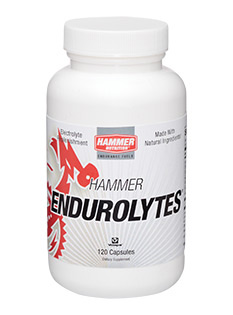What are electrolytes?
Electrolyte is a medical/scientific term for salts, specifically ions. They’re important for many reasons:
- Electrolytes are what your cells (especially nerve, heart, and muscle cells) use to maintain voltages across their cell membranes
- Electrolytes and carry electrical impulses (nerve impulses and muscle contractions) across themselves and to other cells.
- When electrolytes have been depleted through sweat from exercising, specifically sodium and potassium, your muscles and nerves lose the ability to carry electrical impulses across cells properly and this can lead to muscle cramping.
 A more serious depletion of electrolytes combined with too much water intake causes Hyponatremia (Hyponatremia is an abnormally low concentration of sodium in your blood). This cannot only send you to the hospital, but can also result in death.
A more serious depletion of electrolytes combined with too much water intake causes Hyponatremia (Hyponatremia is an abnormally low concentration of sodium in your blood). This cannot only send you to the hospital, but can also result in death.
* Please see our hydration article to determine how much water you should be drinking.
Just drinking water is not enough to prevent your electrolytes from being depleted. Consuming a sports drink such as Hammer HEED or CytoMax is a common way to replenish electrolytes. When you run and aren’t carrying sports drinks, then many gels brands also have electrolytes.
Here are some important considerations about sport drinks and gels:
- Sport drinks and gels typically include carbohydrates for energy as well as electrolytes for hydration.
- When choosing a product, make sure you read the ingredients and eliminate any choices that use high fructose corn syrup to ensure you don’t go through a quick energy spike and a faster energy drop.
- Electrolytes are added to the sports drinks. Maltodextrin is one of the better choices for a carbohydrate source.
- If there are not many electrolytes in your favorite carb product, then you can also take electrolyte capsules such as Hammer Endurolytes or Succed! S!CAPS, NUUN or use a liquid drop such as Elite, by adding it into your existing sports drink or taking it with water.
- Most gels usually have electrolytes added into them as well. Typically they only have sodium and potassium so extreme conditions will require one of the electrolyte supplements
The most important thing to remember when running longer than one hour: Always find a way to use a sports drink,gel or some other form of electrolyte replacement instead of just drinking plain water. Water by itself just isn’t enough.
How much do you need per hour?
If you are doing an event that is over 2 hours long, then the minimum amount of sodium that you need is 500 mg per hour along with the other electrolytes that come with it. When you are racing in extreme conditions or you are a heavy sweater, then that requirement may go up to 1000 mg. Always check the labels of the drinks or gels you are using. Then use those capsules or drops if you have to in order to get enough. If you make a mistake, then it is okay to take a little too much electrolytes rather than not enough.
Recovery drinks are great for replacing electrolytes after a run, especially after a long run. The really good sports drinks have more than just sodium and potassium.
Other electrolytes info
List of electrolytes: (first 5 being the most important)
- Sodium
- Potassium
- Chloride
- Calcium
- Magnesium
- Bicarbonate
- Phosphate
- Sulphate
Foods that contain electrolytes:
- Potassium can be found in beef, fish, milk, fruits, and vegetables, especially avocado, bananas, cantaloupe, honeydew melons, raisins, grapefruit, oranges and baked potatoes.
- Calcium can be found in milk, yogurt, salmon, shrimp, dark leafy vegetables, dried beans and peas.
- Magnesium can be found in whole grain products, nuts, apricots, dark leafy vegetables, and soybeans.
- Sodium can be found in pretty much anything you eat. It is typically the most consumed and expended electrolyte.
